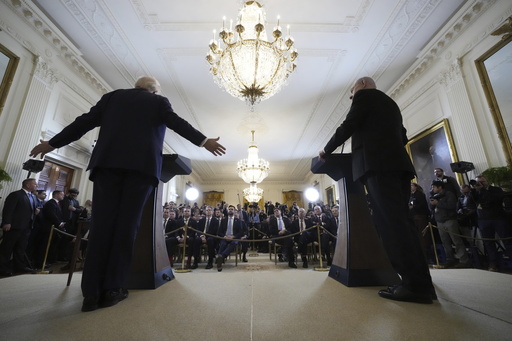
CAIRO — U.S. President Donald Trump’s declarations about transforming Gaza into the “Riviera of the Middle East” hide what human rights organizations describe as an attempt to forcibly remove its over 2 million Palestinian residents. These groups warn that such actions could escalate to war crimes according to international law.
Recently, Trump reiterated his intent to permanently displace Palestinians from Gaza, suggesting that they would be denied the right to return. He even hinted at pressuring Egypt and Jordan to accept them, potentially by threatening a cut in U.S. financial aid.
This proposal has been met with firm rejection from Palestinians, who argue that such rhetoric diminishes their existence and underlines the belief that they have no rightful claim to their land or homes. Munir Nuseibah, a professor of international law at Al-Quds University, criticized Trump’s approach, stating it treats Palestinians as if they could be relocated without any consideration for their autonomy and choices.
Trump has framed his plan as beneficial to the Palestinian people, especially following the devastation of Gaza due to Israel’s 16-month military offensive that wrecked numerous neighborhoods and left living conditions dire. He promises that they would receive “beautiful new land” elsewhere to replace what was lost.
The United States is positioned as the entity that would manage this new territory, rebuilding it into a desirable location for global citizens. However, the Palestinian populace has consistently emphasized their desire to remain in Gaza, which is one of the few areas they still consider a part of their homeland following the wars of 1948 and 1967.
Despite the severe challenges posed by the destruction in Gaza, the Palestinian community expresses a strong commitment to remain and rebuild, with hopes of receiving international support as part of a U.S.-mediated ceasefire with Israel. This ongoing conflict is significantly rooted in historical grievances stemming from the wars of 1948 and 1967, during which many Palestinians were forcibly displaced from their lands. Their aspiration is to reclaim these territories as part of their envisioned future state.
Trump’s vagueness about how the relocation of Palestinians would occur raises concerns about potential forced displacements. When pressed about whether the U.S. would indeed compel Palestinians to leave, Trump asserted that they would voluntarily seek to leave, indicating some form of relocation strategy without clear outlines.
In conversations surrounding the reconstruction of Gaza, Trump indicated a vision where it might serve as a residence for diverse populations, including Palestinians, but later suggested that improved living conditions would lead to a permanent cessation of their presence in Gaza. He claimed that all displaced individuals would find homes in safer communities in the future.
Ongoing fighting in Gaza has been temporarily halted due to a ceasefire, but risks persist as both sides negotiate implications for a potential second phase of their agreement, particularly concerning Gaza’s governance.
The current ceasefire hangs by a thread, as accusations of infractions arise from Hamas, which claims that Israel violated the truce. Israeli Prime Minister Benjamin Netanyahu has also warned that his government might reconsider its commitments if Hamas does not secure further hostage releases.
The discussion of a mass transfer of Palestinians, once a fringe topic in Israeli politics, is now entering mainstream dialogue, driven by the frustration over continuous failed peace negotiations and escalating tensions, especially following the October 7, 2023, Hamas attack that reignited the conflict. Israeli officials have been framing this as a narrative of “voluntary” migration, further complicating the issue.
International law, particularly the Geneva Conventions, strictly forbids any large-scale involuntary removal of populations from occupied territories. The International Criminal Court also stipulates that such forcible transfers could be classified as war crimes or, under certain circumstances, crimes against humanity. Historical precedents support this, referencing instances from the Nuremberg trials post-World War II and UN tribunals after the Balkan wars of the 1990s.
Human Rights Watch’s deputy director for the Middle East and North Africa, Adam Coogle, expressed reservations about whether Trump’s declarations might translate into policy but acknowledged the significant concern stemming from his intentions. The potential dislocation of Palestinians from their native territory raises serious ethical and legal implications.
Amnesty International concurs that the forced expulsion of Palestinians constitutes a war crime and potentially amounts to a crime against humanity. Nuseibah noted that various international judicial bodies have ruled that any coercive attempts to compel people to leave their land could be classified as forced transfer, emphasizing that it does not necessarily require overt violence to qualify.
When asked by a reporter if the discussions surrounding the relocation of Palestinians could be construed as ethnic cleansing, Trump sidestepped the query, only reiterating that those displaced would be moved to a more appealing location.
The Palestinian community has expressed disbelief at Trump’s audacity to speak on their behalf, with calls for open dialogue about their desires for the future of their homeland. Raji Sourani, a prominent human rights lawyer from Gaza, described Trump’s actions as surreal and unprecedented in the history of U.S. foreign policy.
Sourani accused Trump of attempting to finalize what he perceives as genocidal actions initiated by Israel against the Palestinian people. The International Court of Justice is examining claims that Israel’s military efforts in Gaza could be characterized as genocide, a charge Israel denies, asserting its actions are in response to threats from Hamas.
Demonstrating their commitment to remain in Gaza, many Palestinians have returned to their homes during the ceasefire, even in areas that are now in ruins. Hatem Mohammed, for instance, set up a makeshift shelter on the ruins of his home, reclaiming his identity and heritage despite the destruction surrounding him, firmly stating that their identity will endure amidst attempts to deny it.

